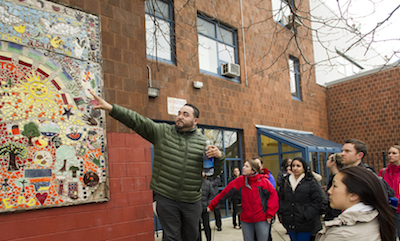“Sometimes Public Health Is About Taking a Stand”.
 The Office for Public Health Practice launched the Activist Lab this spring to help bridge the gap between academic work and action. Seeking to educate, innovate, and advocate, the lab serves as a catalyst between the School of Public Health and the wider community, hosting symposia, workshops, and workforce training programs; engaging partners and community stakeholders; and developing and implementing programs and policy on everything from housing to oral health to gun violence.
The Office for Public Health Practice launched the Activist Lab this spring to help bridge the gap between academic work and action. Seeking to educate, innovate, and advocate, the lab serves as a catalyst between the School of Public Health and the wider community, hosting symposia, workshops, and workforce training programs; engaging partners and community stakeholders; and developing and implementing programs and policy on everything from housing to oral health to gun violence.
Associate Dean for Public Health Practice Harold Cox directs the Activist Lab. Cox discussed the thinking behind it, and the role of advocacy in public health.
How did the Activist Lab come about?
When Dean Galea came in, he and I talked about what would make for an impactful way of thinking about practice at the School. We decided to create an entity to do real-world public health, that will both complement what our students are getting in their educational and research components of their program here, as well as an entity that will look at real-world problems and use the resources that we have at the School to attempt to address them.
What role does activism play in public health?
When we talk about activism, the first thing that comes to mind is standing outside holding a sign. Well, that’s one kind of activism, but it’s also activism to bring together stakeholders to define what is a problem. It’s also activism when you decide that smoking is a problem in the world and that we should do something to decrease smoking and exposure of smoke to individuals. Public health is about identifying problems and taking action—and sometimes it’s about taking a stand.
What are you most excited about so far?
I’m excited about the chance to be able to do this. It’s very different from anything that’s happening in any other school. There are certainly a number of schools that address a variety of different issues—we’re clearly not the only ones that have decided that a problem exists someplace. We are, however, the only place I know of that has pulled it together in quite this way, and who embrace the idea of taking a stand and engaging our whole school.
I’m proud of the fact that we have been given the opportunity to put together this enterprise, I’m proud that we’ve been given this opportunity to take a stand, and I’m proud that we are developing our faculty, staff, and students and our research in such a way as to be able to do that.